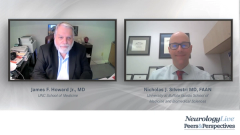
Investigational Agents for Myasthenia Gravis
Two subject matter experts discuss promising treatment methods and agents in the pipeline for patients with myasthenia gravis.
Episodes in this series

Dr. James F. Howard: There are lots of others, or new kids on the block. And I accused a CEO of one pharmaceutical company that Pharma's interest was the fact that they could pronounce and spell the word myasthenia. But we now have CAR-T under trial for both AChR positive and negative MG, as well as MuSK MG. There's no data that we can look at. There is some minimal data put forth at this international meeting, but it's still much too early. We're targeting other elements of immune system with the new B-cell depleters that may be better than say rituximab in the treatment of AChR myasthenia. We believe that in that instance while working beautifully for MuSK has not been so great in AChR positive. And we believe the cell type that is targeted is too narrow with rituximab. And by expanding it to CD19 inhibitors, rather than CD20, we may have some improvement there. There are trials looking at IL-6. There are trials looking at CD38 complements. C3 is now being looked at. That's a very rich time for the myasthenia world. And it's a great time to be an integral part of all of this.
Dr. James F. Howard: What other thoughts do you have? What other things do we think we need to convey to our audience?
Dr. Nicholas J. Silvestri: Well, I think if I look back and put it all together, I think that myasthenia is a rare disease, but it is treatable. I think that over time, our goals of therapy really have, or should evolve from getting patients better and keeping them out of the hospital to making patients forget they have myasthenia and, or on medicines for it. Really, pushing for minimal symptom expression, as we talked about or minimal manifestation status, the terms that you defined for as previously. But in layman's terms, basically, patients that are minimally or asymptomatic that tolerate their treatments, that don't really pose long-term risks. I think that's really aspirational. And then I think just to piggyback on that from this last portion of the talk, people can see that there have been new therapies recently approved and there's plenty down the pike. I think there is a lot of reason to be hopeful for patients with myasthenia and for those of us docs who treat patients with myasthenia, that though what we may have had in the past may not have been optimal for certain patients, newer therapies and emerging therapies really offer a lot of other options. It is truly exciting to be a part of this right now.
Transcript Edited for Clarity
Newsletter
Keep your finger on the pulse of neurology—subscribe to NeurologyLive for expert interviews, new data, and breakthrough treatment updates.






